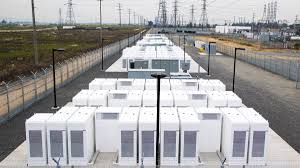Vistra Energy, a retail power company has proposed a new battery project in the state of California that will double the output of the world’s largest battery storage facility that they recently completed. The company inaugurated the 300MW / 1,200MWh Moss Landing Energy Storage Facility just before the end of 2020 in California’s Monterrey Bay and announced its commissioning early in 2021. A month ago, towards the end of January, Vistra Energy representatives appeared at a meeting of the city council of Morro Bay, about 150km south of Moss Landing to discuss future plans for a 600MW standalone battery energy storage facility.
Also Read: Construction of 1.1GW solar and storage project in California begins
The Morro Bay Energy Storage Facility would be used to absorb excess renewable generation, mainly solar, and put it onto the grid at times when it was most needed. The project would “revitalize” an existing natural gas power plant site, occupying 22 acres of the 107 acre complex with roughly 180,000 lithium-ion batteries housed in three purpose-built, 30ft “low profile” buildings. Other advantages of this particular site for construction, according to the Vistra representatives, are that it would tie into local utility Pacific Gas & Electric’s (PG&E’s) active transmission lines with three new project-level substations connecting to PG&E’s existing substation built to take electricity away from the gas power plant which was there already.
The proposed Vistra energy battery project development is being timed to coincide with the upcoming retirement of California’s Diablo Canyon nuclear power plant, which is scheduled to happen during 2024. If the Morro Bay project can begin construction next year, Cherniss said, it could be online around the time that retirement happens. The project could help the state meet its urgent needs for Resource Adequacy while contributing to Vistra’s emissions reduction goals. The project is a new part of Vistra’s plans ahead, with the power retailer recently unveiling a plan called ‘Vistra Zero’ which promises to accelerate its fossil fuel retirements including 7,500MW of coal by 2027 and deploy around 9GW of renewables around the US by 2030

Leave a Reply